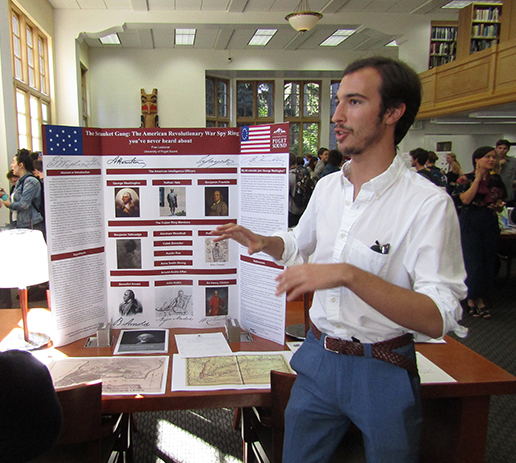With our Presidential Election in November, Constitution Day in September, and the Anniversary of the 19th Amendment, Collins Library is pleased to host a series of blog posts by Fran Leskovar.
If you are an American politics nerd, as I am, you probably enjoy watching presidential and vice-presidential debates. It is like watching the Super Bowl. Two teams are competing, and as in football there are memorable moments and the audience is often amused.
In 1988, Senator Lloyd Bentsen of Texas delivered one of the most famous lines in American politics during the vice presidential debate. Responding to Senator Dan Quayle’s remark that he had as much experience as John Kennedy had when running for President, Bentsen responded with the following: “Senator, I served with Jack Kennedy. I knew Jack Kennedy. Jack Kennedy was a friend of mine. Senator, you are no Jack Kennedy.” Another memorable moment was in 1992 when President George H. W. Bush looked at his watch during the debate while a person in the audience was asking a question.
Historians often trace the tradition of debates to the famous Illinois Senate race of 1856 when there were seven debates held between Abraham Lincoln and Stephen A. Douglas. However, the first modern presidential debate that often is cited is one between President John F. Kennedy and Richard Nixon during the 1960 presidential elections.
The four Kennedy-Nixon debates were the first televised debates and showcased the power of television. Many people listening to the debate on their radio receivers were convinced that Richard Nixon was the clear frontrunner. But people watching them on their television screens got a totally different picture. They saw Nixon as weak and confused while seeing Kennedy as a young and capable leader. In the end, Kennedy won the general election narrowly. Today, it is conventional wisdom to attribute, if not wholly, then certainly in part, Kennedy’s victory to his superb performance during the 1960 presidential debates.
The fact that there were no presidential debates from 1964 to 1976 speaks for itself about the impact the first televised debates might have had on the electorate. Both President Johnson and Nixon refused to debate their challengers, Barry Goldwater, Hubert Humphrey, and George McGovern. However, it did not take long before the debates were reintroduced to the American voters and became the cornerstone of our presidential contest. In 1976, President Ford broke this tradition of refusing to debate when he agreed to debate Georgia governor Jimmy Carter who eventually won the election. Since then all presidential races have featured televised debates. In 1987, the Commission on Presidential Debates was established, and debates for candidates seeking the office of the President and Vice President became a permanent part of our electoral system and an important educational venue.
About Fran Leskovar
Fran Leskovar is a two-time recipient of the University Summer Research stipend. His work on the American Revolutionary War espionage has been presented at the AHSS Symposium and Board of Trustees Symposium here, at the University of Puget Sound, and to the national audience at the prestigious Richard Macksey National Undergraduate Humanities Research Symposium at the John Hopkins University and University of Washington Undergraduate Symposium. Fran Leskovar is currently publishing his paper titled “The American Revolutionary Intelligence: The Culper Ring and The Notion of Liminality” in the Macksey Undergraduate Journal. Besides his interest in the American Revolution and early years of American state, Fran Leskovar has a considerable background in the history of Cold War and European history. This summer, he has been working on a paper titled “‘Playing Hapsburg:’ The Hapsburg Monarchy and The post-Yugoslav Croatian Society” in which he explains why such a strong sentiment for the Hapsburg past exists in the post-1990s Croatian society.”
For additional thoughts on democracy and voting, check out these related posts:
https://blogs.pugetsound.edu/collinsunbound/category/spotlight-on-the-constitution-voting-rights-and-elections/

